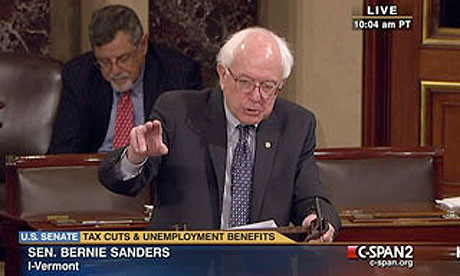In what is being heralded as a “brave tactic,” Senator Bernie Sanders (I-Vt.) on Wednesday temporarily blocked lawmakers from rushing through legislation that would allow the Obama administration to “Fast Track” the controversial and highly secretive Trans-Pacific Partnership agreement.
Sanders forcibly delayed the Senate Finance Committee from considering Fast Track legislation by using a rarely invoked senate scheduling rule, effectively preventing the panel from looking at the trade bill until at least 4:00 PM. The committee was widely expected to endorse the legislation.
Although not technically a filibuster, Sanders’ maneuver is being compared to the delaying tactic and is being met with vows from Fast Track proponents to do whatever it takes to move the legislation forward.
Huffington Post reporter Zach Carter explained Wednesday that the delay, nonetheless, is significant “because Senate Democrats, including Sherrod Brown (D-Ohio), have prepared dozens of amendments to the fast-track bill, which will take several hours to address in committee. If the panel can’t finish its work Wednesday, or just decides to call it a day early and resume its business tomorrow, Sanders can raise the same objection again, potentially delaying the process for several days.”
Sanders said he took this step over concerns that the deal, despite its vast impact, is being rushed through Congress without public debate, or even knowledge of its contents.
“It is absurd that a trade agreement of such enormous consequence has had so little transparency,” said Sanders in a press statement released Wednesday. “It is beyond belief that this agreement would let corporations sue over laws to protect public health and the environment.”
“This job-killing trade deal has been negotiated in secret. It was drafted with input by special interests and corporate lobbyists but not from the elected representatives of the American people,” Sanders continued. “Instead of rubber stamping the agreement, Congress and the public deserve a fair chance to learn what’s in the proposal.”

